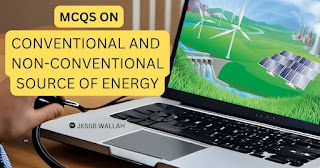MCQS ON CONVENTIONAL AND NON-CONVENTIONAL SOURCE OF ENERGY
1. Which of the following is a conventional source of energy?
a) Solar
b) Coal
c) Geothermal
d) Wind
The correct answer is b) Coal.
2. Which type of energy is obtained from the motion of wind?
a) Wind Energy
b) Geothermal Energy
c) Solar Energy
d) Tidal Energy
The correct answer is a) Wind Energy.
3. What is the primary source of energy in non-conventional sources?
a) Geothermal Heat
b) Wind
c) Sun
d) Fossil Fuels
The correct answer is c) Sun.
4. Which non-conventional source of energy involves the conversion of sunlight into electricity?
a) Geothermal Energy
b) Wind Energy
c) Tidal Energy
d) Solar Energy
The correct answer is d) Solar Energy.
5. Which of the following is a conventional source of energy derived from decayed plant and animal remains?
a) Wind
b) Geothermal
c) Solar
d) Coal
The correct answer is d) Coal.
6. Which non-conventional source of energy uses the movement of tides to generate electricity?
a) Solar Energy
b) Tidal Energy
c) Geothermal Energy
d) Wind Energy
The correct answer is b) Tidal Energy.
7. Which conventional source of energy is primarily responsible for air pollution and greenhouse gas emissions?
a) Petroleum
b) Hydropower
c) Coal
d) Natural Gas
The correct answer is c) Coal.
8. Which non-conventional source of energy involves tapping into the Earth’s internal heat for power generation?
a) Solar Energy
b) Wind Energy
c) Geothermal Energy
d) Tidal Energy
The correct answer is c) Geothermal Energy.
9. Which of the following is a limitation of solar energy?
a) It requires a lot of water
b) It is harmful to the environment
c) It is expensive to set up
d) It is available only during the day
The correct answer is d) It is available only during the day.
10. Which conventional source of energy is often used in vehicles and airplanes?
a) Nuclear Energy
b) Petroleum
c) Coal
d) Natural Gas
The correct answer is b) Petroleum.
11. Which non-conventional source of energy harnesses the kinetic energy of flowing water?
a) Hydropower
b) Solar Energy
c) Nuclear Energy
d) Biomass
The correct answer is a) Hydropower.
12. What is the main environmental advantage of non-conventional sources of energy?
a) They are cheaper
b) They are easier to transport
c) They produce less pollution
d) They are more abundant
The correct answer is c) They produce less pollution.
13. Which conventional source of energy is often used for heating and electricity generation?
a) Natural Gas
b) Wind Energy
c) Tidal Energy
d) Solar Energy
The correct answer is a) Natural Gas.
14. Which non-conventional source of energy uses organic materials for power generation?
a) Nuclear Energy
b) Tidal Energy
c) Biomass
d) Geothermal Energy
The correct answer is c) Biomass.
15. Which conventional source of energy is primarily used for transportation and industrial processes?
a) Natural Gas
b) Hydropower
c) Coal
d) Petroleum
The correct answer is d) Petroleum.
16. Which non-conventional source of energy is known for its reliability and consistency?
a) Hydropower
b) Tidal Energy
c) Wind Energy
d) Geothermal Energy
The correct answer is a) Hydropower.
17. Which conventional source of energy releases harmful greenhouse gases when burned?
a) Petroleum
b) Coal
c) Hydropower
d) Natural Gas
The correct answer is b) Coal.
18. Which non-conventional source of energy is generated by the gravitational pull of the Moon?
a) Solar Energy
b) Wind Energy
c) Geothermal Energy
d) Tidal Energy
The correct answer is d) Tidal Energy.
19. Which conventional source of energy is abundant but finite?
a) Coal
b) Petroleum
c) Hydropower
d) Natural Gas
The correct answer is a) Coal.
20. Which non-conventional source of energy involves the splitting of atomic nuclei?
a) Solar Energy
b) Tidal Energy
c) Wind Energy
d) Nuclear Energy
The correct answer is d) Nuclear Energy.
21. Which conventional source of energy is known for its high energy density and clean burning?
a) Natural Gas
b) Coal
c) Petroleum
d) Hydropower
The correct answer is a) Natural Gas.
22. Which non-conventional source of energy involves capturing and storing carbon dioxide emissions?
a) Tidal Energy
b) Biomass
c) Geothermal Energy
d) Solar Energy
The correct answer is b) Biomass.
23. Which conventional source of energy is a solid fossil fuel often associated with power plants?
a) Coal
b) Natural Gas
c) Petroleum
d) Hydropower
The correct answer is a) Coal.
24. Which non-conventional source of energy uses the heat from the Earth’s interior?
a) Solar Energy
b) Tidal Energy
c) Geothermal Energy
d) Wind Energy
The correct answer is c) Geothermal Energy.
25. Which conventional source of energy is most commonly used for electricity generation worldwide?
a) Natural Gas
b) Coal
c) Petroleum
d) Hydropower
The correct answer is b) Coal.
26. Which non-conventional source of energy involves the capture of energy from ocean waves?
a) Solar Energy
b) Tidal Energy
c) Wind Energy
d) Wave Energy
The correct answer is d) Wave Energy.
27. Which conventional source of energy is the primary fuel for most vehicles?
a) Natural Gas
b) Coal
c) Petroleum
d) Hydropower
The correct answer is c) Petroleum.
28. Which non-conventional source of energy is generated by harnessing the energy of fast-moving water in rivers?
a) Tidal Energy
b) Wave Energy
c) Hydropower
d) Geothermal Energy
The correct answer is c) Hydropower.
29. Which non-conventional source of energy involves converting organic waste into biogas?
a) Tidal Energy
b) Wave Energy
c) Biomass
d) Geothermal Energy
The correct answer is c) Biomass.
30. Which conventional source of energy is considered the cleanest among fossil fuels?
a) Natural Gas
b) Coal
c) Petroleum
d) Hydropower
The correct answer is a) Natural Gas.
31. Which non-conventional source of energy is generated by harnessing the heat from the Earth’s interior?
a) Solar Energy
b) Tidal Energy
c) Geothermal Energy
d) Wind Energy
The correct answer is c) Geothermal Energy.
32. Which conventional source of energy is derived from the remains of prehistoric plants and animals?
a) Coal
b) Natural Gas
c) Petroleum
d) Hydropower
The correct answer is c) Petroleum.
33. Which non-conventional source of energy uses the energy of the sun to produce electricity?
a) Solar Energy
b) Tidal Energy
c) Wind Energy
d) Geothermal Energy
The correct answer is a) Solar Energy.
34. Which conventional source of energy is often associated with the production of greenhouse gases?
a) Coal
b) Natural Gas
c) Petroleum
d) Hydropower
The correct answer is c) Petroleum.
35. Which non-conventional source of energy uses the movement of air to turn turbines?
a) Solar Energy
b) Tidal Energy
c) Wind Energy
d) Geothermal Energy
The correct answer is c) Wind Energy.
36. Which conventional source of energy is primarily used for cooking and heating?
a) Natural Gas
b) Coal
c) Petroleum
d) Hydropower
The correct answer is a) Natural Gas.
37. Which non-conventional source of energy uses the kinetic energy of wind to generate electricity?
a) Solar Energy
b) Tidal Energy
c) Wind Energy
d) Geothermal Energy
The correct answer is c) Wind Energy.
38. Which conventional source of energy is often associated with air pollution and acid rain?
a) Coal
b) Natural Gas
c) Petroleum
d) Hydropower
The correct answer is a) Coal.
39. Which non-conventional source of energy uses the gravitational pull of the Moon to generate electricity?
a) Solar Energy
b) Tidal Energy
c) Wind Energy
d) Geothermal Energy
The correct answer is b) Tidal Energy.
40. Which conventional source of energy is a liquid fossil fuel often used for transportation?
a) Natural Gas
b) Coal
c) Petroleum
d) Hydropower
The correct answer is c) Petroleum.
41. Which non-conventional source of energy involves capturing sunlight and converting it directly into electricity?
a) Solar Energy
b) Tidal Energy
c) Wind Energy
d) Geothermal Energy
The correct answer is a) Solar Energy.
42. Which conventional source of energy is often used for backup power generation?
a) Natural Gas
b) Coal
c) Petroleum
d) Hydropower
The correct answer is a) Natural Gas.
43. Which non-conventional source of energy uses the Earth’s magnetic field to produce electricity?
a) Solar Energy
b) Tidal Energy
c) Wind Energy
d) Geothermal Energy
The correct answer is d) Geothermal Energy.
44. Which conventional source of energy is considered the most versatile and widely used?
a) Natural Gas
b) Coal
c) Petroleum
d) Hydropower
The correct answer is c) Petroleum.
45. Which non-conventional source of energy involves capturing and utilizing heat from the Sun stored in the Earth’s surface?
a) Solar Energy
b) Tidal Energy
c) Wind Energy
d) Geothermal Energy
The correct answer is d) Geothermal Energy.
46. Which conventional source of energy is primarily used for heating homes and buildings?
a) Natural Gas
b) Coal
c) Petroleum
d) Hydropower
The correct answer is a) Natural Gas.
47. Which non-conventional source of energy involves converting plant and animal waste into biogas?
a) Solar Energy
b) Tidal Energy
c) Biomass
d) Geothermal Energy
The correct answer is c) Biomass.
48. Which conventional source of energy is a renewable resource that relies on the Earth’s gravitational force?
a) Natural Gas
b) Coal
c) Petroleum
d) Hydropower
The correct answer is d) Hydropower.
49. Which non-conventional source of energy involves capturing energy from the movement of water in rivers?
a) Solar Energy
b) Tidal Energy
c) Hydropower
d) Geothermal Energy
The correct answer is c) Hydropower.
50. Which conventional source of energy is known for its high energy content and easy transportability?
a) Natural Gas
b) Coal
c) Petroleum
d) Hydropower
The correct answer is c) Petroleum.

